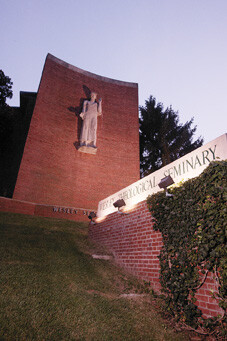
Wesley Seminary celebrates 50 years in Washington
BY LINDA WORTHINGTON
UMCONNECTION STAFF
"As a community of faith we are called to stand firmly between heritage and hope," began the greeting in the chapel at Wesley Seminary's celebration of its move 50 years ago from Westminster to Washington, D.C., Sept. 30.
Classes began at the D.C. campus Oct. 1, 1958.
 The service was "like one of those historical markers on the highway," said seminary president, the Rev. David McAllister-Wilson. That history - and Wesley's story line - "is about the Kingdom of God and that there is Good News emanating from a moment in time."
The service was "like one of those historical markers on the highway," said seminary president, the Rev. David McAllister-Wilson. That history - and Wesley's story line - "is about the Kingdom of God and that there is Good News emanating from a moment in time."
McAllister-Wilson recounted a little of the history of the move to Washington.
Bishop G. Bromley Oxnam wanted a Protestant seminary in the city, he recalled. He met resistance, including from the then-president of the seminary. But that didn't stop the bishop. He joined with the new president, the Rev. Norman L. Trott), and together they built the new seminary from scratch, all at once.
In the process they gained three times as many students.
Two people who sang in the seminary choir at the first services 50 years ago were present.
The Rev. David Balcom, a 1959 graduate and 1990 recipient of the Society of John Wesley Award, was one of them.
He was the fifth student to preach his senior sermon in the chapel. That was December 1958, "and I've attended every reunion since 1953," the Virginia Conference retired pastor said.
Also present was Bess Jones, for whom a dining room is named. She was administrative assistant to Trott, the first president, and has "broken in every president since Trott," she said, as paid staff for 26 years and as a volunteer ever since. (Jones died the next day. See tribute, page 6.)
"Many of us country boys found ourselves out of our comfort zones," said retired pastor, the Rev. Bill Miller, one of the students in the first group. "Counter-culture ideas were fermenting. Social injustices were beginning to be addressed. Integration was on the horizon."
"That's why I came to Washington," McAllister-Wilson said. "The issues have changed ... but Wesley in Washington is the place for people who want to make a difference in the world."
Students from several countries participated in the service, modeling the present and future of the seminary as they read Scripture or liturgy in Korean, Spanish, Telugo and Twi.
"We get to where (the church) just isn't working anymore; we get hacked, phished and we're full of culture cookies," McAllister-Wilson said as he used computerese to move from past history to the present and future.
"We try to reboot to the source; and we call it a ‘reformation.' That's what seminary education should be about - to re-imagine and rebuild the church."
Part of that re-imagining is Wesley's new urban ministry partnership at Mt. Vernon Place UMC.
This innovative new program started with Margaret Pittman, a member at the church who challenged McAllister-Wilson to become a Sunday School teacher at the church and who left her estate to endow the seminary's Urban Ministry Program.
Wesley's Urban Ministry Program and its Initiative for Public Theology will both be housed in a new 12-story building under construction on the site of Mt. Vernon Place's former education building.
"We are creating the seminary equivalent of a ‘teaching hospital,'" McAllister-Wilson said. "Mt. Vernon Place is a symbol of all we're going to do about the church. We're in a reformation of the church."
McAllister-Wilson said that 48 percent of the students today (1,500 attended classes last school year) are in their 20s in age, a far cry from the student population of the 80s. "We have big plans, we've come a long way. ... We've entered tough times in the city, the country and the institution." But like a driver approaching a yellow light at an intersection, "we'll keep going,"
he said.
"Wesley is a success if our alumni and the churches we serve begin to look much more like the Kingdom of God then they do now."
Wesley Seminary's Plan
Developed in 2004, the seminary's strategic plan has four goals:
- To prepare exemplary teachers, preachers and leaders;
- To become a truly global seminary;
- To make effect use of our location in Washington, D.C.;
- To make the Wesley campus a place for spiritual retreat and formation.

Login/Register to leave comment